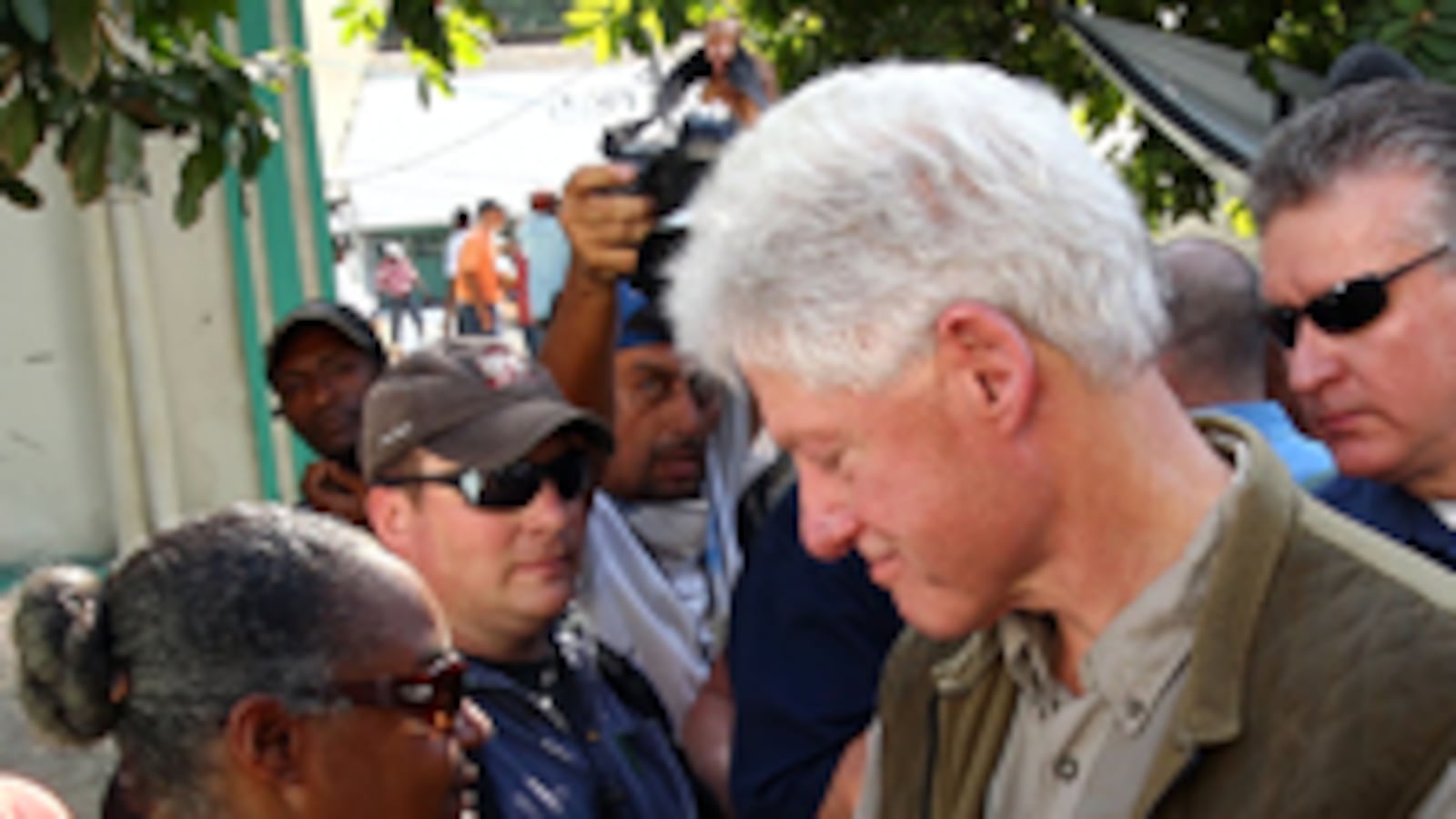
Like many Haitians and not a few Americans who know the island and its history, I had mixed feelings watching the video of former President Clinton step off a plane on to the tarmac at Toussaint Loverture International Airport in Port-au-Prince on Monday afternoon. Bill Clinton, the Second Coming of Hope. The First Coming, the U.S.-led invasion in 1994 adorned with 20,000 American troops, did not turn out so well. By 1996, when the American military decamped, you’d be hard pressed to find a Haitian on the streets of Port-au-Prince who wasn’t suffering miserably from hope. By 1996, Haitians were scratching their heads in bewilderment, asking themselves Why has America come to save us? Who will save us now? Ten years later, by almost every measure, Haiti was worse off than it was before Clinton had “rescued” it from the illegitimate regime of General Raoul Cedras and his gang of terrorist enforcers, known by the acronym FRAPH.
I had heard the Haitians saying of the U.S. after the American troops went home: “Lave men ou, siye li a te. It looks like you wash your hands and dry them in dirt.”
It’s the proper time, of course, to ask what is the legacy of American foreign policy in Haiti, a beleaguered neighbor that we have invaded and occupied twice in the 20th century, the first time to preempt German influence there during and after World War I, the second time during the early years of the Clinton administration, an 18-month long intervention which I reported on for Harper’s magazine.
Looking at the images pouring out of Haiti these days, what comes immediately into focus is the near-sighted, irrational nature of what is out of focus in American foreign policy since the Marshall Plan worked its miracles on a shattered planet. I think that we can all agree that Haiti has finally found its bottom, but the descent, lubricated by man-made folly, was not inevitable.
To be sure, Haiti brings out the cynic in me. Perhaps I should express that sentiment with more precision: The United States’ two-faced relationship with Haiti stirs a cynicism within me that I’d rather not claim.
The U.S. Army came ashore in September 1994 locked and loaded to do battle with a military dictatorship composed of a tiny dysfunctional army and roving bands of FRAPH’s homicidal thugs, who threatened to send America’s sons and daughters back home in coffins. Essentially an absurd boast but from a genuine enemy. Colin Powell’s brinkmanship defused the potential for bloodshed on the eve of the invasion, yet the fact remained—our soldiers would be liberating villages, towns, and cities controlled by a terrorist organization that had brutalized the population.
Early on, there were shootouts between U.S. soldiers and FRAPH. Special Forces hunted down FRAPH leadership in the countryside, captured them and shipped the detainees to headquarters in Port-au-Prince, where, to general dismay, they were invariably released. One night, hunkered down with a detachment of Green Berets in the mountains south of Cap Haitien, I listened in alarm to a radio transmission from Col. Mark Boyatt, the overall commander of Special Forces in Haiti, telling his commandos to begin regarding FRAPH as Haiti’s “loyal opposition,” as if the terrorists, overnight, had become Haiti’s equivalent to the Republican Party, rehabilitated patriots eager to remake Haiti into a modern democratic nation.
Months later, when I challenged Colonel Boyatt on this highly counterproductive order to his troops, he clammed up on me. For the next two years, I tried to track down who in the chain of command had told Boyatt to whitewash the terrorist organization FRAPH. The trail finally led to the American Embassy in Port-au-Prince, and then it jumped to the mainland, Sandy Berger, and the White House.
Legacy No. 1: We left the poison in the system. The result: A Haiti rendered ungovernable by our heedless self-interest. The only Devil in Haiti is to be found in the deals we cut with the worst elements in that society. Sound familiar?
On March 31, 1996, the United States handed over Operation Restore Democracy to the United Nations and a peacekeeping force that has been there ever since. Early in the Clinton administration’s intervention in Haiti, the word came down to the boots on the ground from the White House: You have not been deployed to conduct nation-building. The mission turned out to be foolishly attenuated: Restore Haiti’s first democratically elected president, Jean Bertrand Aristide, to the National Palace. Hold elections that will remove the troublesome Aristide from the National Palace. Go home.
Ultimately, the mission ended up profoundly disillusioning not only the Haitians but the American troops as well. Back at Fort Bragg, I asked a Special Forces Master Sergeant if he was glad he went to Haiti. “Tough question,” he said. “No carpenter likes to build a house and see it crooked and leaning and ready to fall down the day he leaves. But if he builds a nice house, he’s happy about it, it’s something he’ll be proud of the rest of his life."
“You don’t think you have anything to be proud of?” I asked.
“No.”
“That’s sad,” I said.
“It is,” said the Master Sergeant. “It is.”
I told him what I had heard the Haitians saying about the United States after the American troops went home. Lave men ou, siye li a te. It looks like you wash your hands and dry them in dirt.
Legacy No. 2: In Haiti, America wasted a perfectly good occupation. Call our post-earthquake presence there anything you want, but let’s hope it works out better this time around. Good luck, Bill. And remember, merry are the builders.
Bob Shacochis, a professor at Florida State University, is the author of The Immaculate Invasion, a chronicle of the 1994 U.S. intervention in Haiti.




